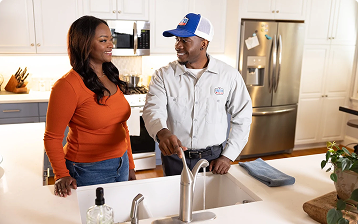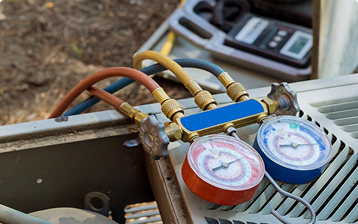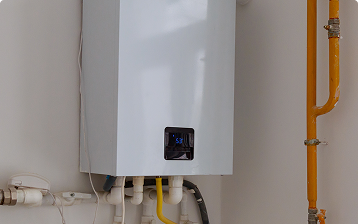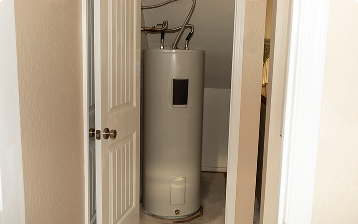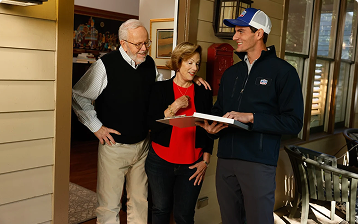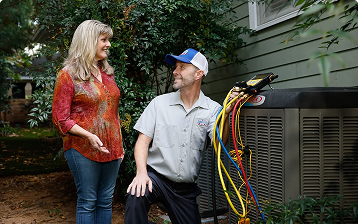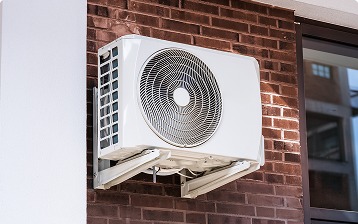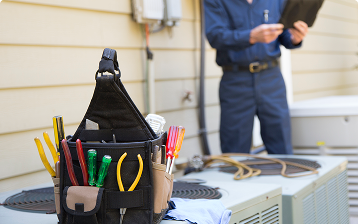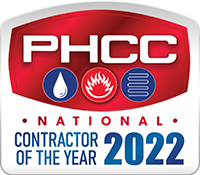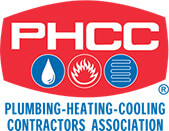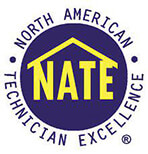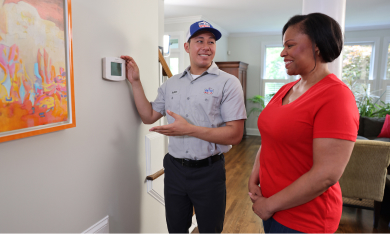
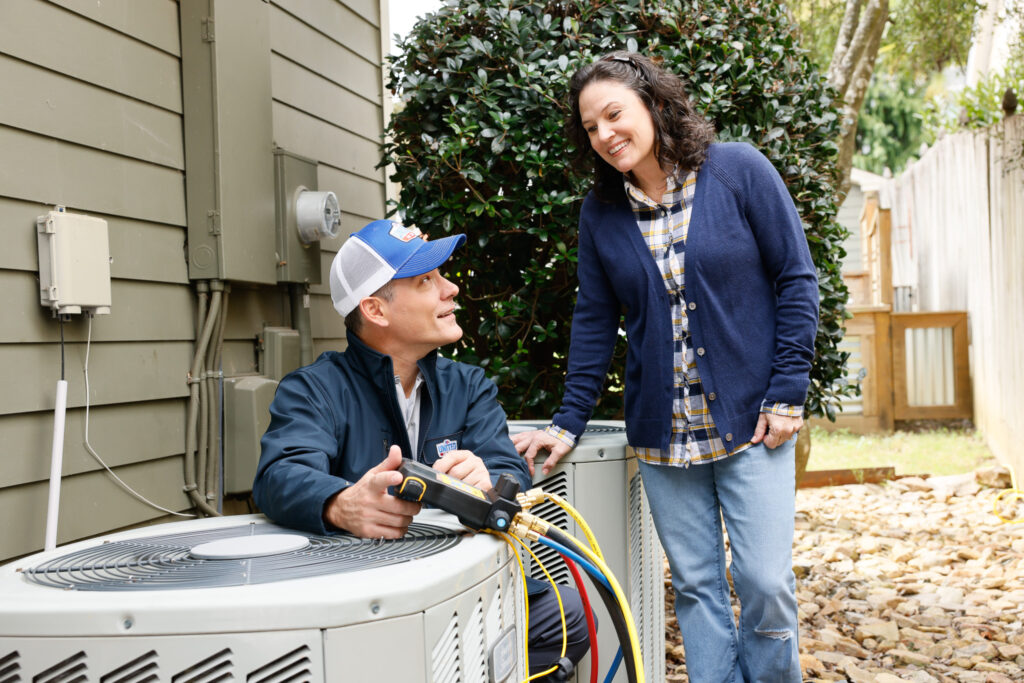
Whether you’re gearing up for the summer heat or wondering if your current AC system is still doing its job, questions about air conditioning come up often, and for good reason. A functioning air conditioning system isn’t just about comfort; it plays a major role in indoor air quality, humidity control, and energy bills. To help homeowners better understand their systems and make informed decisions, we’ve compiled answers to the most frequently asked questions about air conditioning below.
How Much is a New Air Conditioning Unit?
For a standard residential air conditioning system, you can expect to pay between $3,800 – $7,500. That’s a broad range, and several factors affect where your home might fall within it:
- SEER rating: Higher-SEER units cost more upfront but offer long-term energy savings.
- Home size: Larger homes require more powerful systems, which increases the cost.
- Installation complexity: Homes with difficult access points, no existing ductwork, or unique layouts may require additional labor.
There may also be additional costs, including:
- Updating or replacing existing ductwork
- Installing a new thermostat
- Labor charges for removing old equipment or adapting your system
How Do I Maintain My Air Conditioning System?
Routine maintenance can significantly improve your AC unit’s performance and longevity. Here’s what you should prioritize:
- Change air filters every one to three months, depending on usage and indoor air quality.
- Clean condenser and evaporator coils at least once a year to keep airflow unrestricted and maximize cooling efficiency.
- Schedule professional tune-ups before peak cooling season. These inspections can uncover worn components or refrigerant issues before they cause breakdowns.
Can My Air Conditioning Make Me Sick?
When maintained properly, air conditioning enhances comfort and indoor air quality. However, a neglected system can pose health risks:
- Dirty filters and coils may circulate dust, pollen, or mold spores, triggering allergies or asthma.
- Cold, dry air can cause respiratory discomfort, especially in individuals with preexisting conditions.
Mitigate these risks by changing filters regularly and using humidity control tools like whole-house humidifiers or dehumidifiers, depending on your climate.
How Long Do Air Conditioning Units Last?
Most residential air conditioning systems last 12 – 15 years with regular care. Several signs can indicate your system is on its way out:
- Frequent repairs or inconsistent performance
- Rising utility bills
- Uneven cooling across your home
Investing in preventive maintenance not only helps avoid breakdowns but can also stretch your unit’s lifespan closer to the 15-year mark or beyond.
Why is My Air Conditioning Unit Leaking Water?
Water leaks are a common AC issue and can indicate problems like:
- Clogged condensate drain line, causing water to back up and overflow
- Frozen evaporator coils, often due to airflow issues or low refrigerant
- Dirty or clogged air filters, restricting airflow and causing condensation
Ignoring leaks can lead to water damage, mold growth, or even system failure. While clearing a clogged line or changing the filter may solve the problem, professional help is recommended if the issue persists.
How Do You Repair an Air Conditioning Unit?
Some AC issues have simple solutions. Before calling in a technician, check:
- Thermostat settings
- Circuit breakers or power supply
- Condition of the air filter
Common repairs may include fixing refrigerant leaks, replacing faulty capacitors, or correcting electrical faults. If the system isn’t responding after basic checks, it’s best to contact a licensed HVAC technician to avoid further damage or voiding your warranty.
What is Ductless Air Conditioning?
Ductless air conditioning (also called mini-split systems) offer flexible solutions for homes without existing ductwork or those looking to zone specific areas. They consist of:
- One or more indoor air handlers
- An outdoor compressor unit
- Refrigerant lines connecting them
Benefits include high energy efficiency, quiet operation, and easy installation. They’re perfect for home additions, garages, or areas not connected to central HVAC.
How Does Central Air Conditioning Work?
Central AC systems rely on a few key components:
- Condenser unit (outside)
- Evaporator coil and air handler (inside)
- Duct system for air distribution
Air is cooled by the evaporator coil, circulated through the home via ducts, and controlled by your thermostat. The system uses a refrigerant to transfer heat from inside to outside, maintaining a consistent, comfortable indoor temperature.
What is a Mini-Split Air Conditioning Unit?
A mini-split is a type of ductless air conditioner, designed to cool or heat individual rooms. Unlike central systems, they don’t rely on a network of ducts. Instead, they feature:
- Wall-mounted indoor units
- A single outdoor compressor
- Flexible refrigerant tubing
These units are especially helpful for zoned temperature control in homes where full central air isn’t practical, such as converted attics or older homes.
Can a Nest Thermostat Replace Heating & Air Conditioning Controls?
Yes, in most cases. Nest thermostats are designed to work with the majority of HVAC systems. Key features include:
- Smart scheduling
- Remote access via smartphone
- Energy usage reports
However, you should verify compatibility with your existing wiring, particularly in dual-fuel or multi-stage systems. In complex setups, professional installation is strongly recommended to ensure performance and efficiency.
How Do I Charge My Home Air Conditioning System?
“Charging” an air conditioner means adding refrigerant, and it’s not a DIY project. Under EPA regulations, only certified technicians can legally handle refrigerants due to safety and environmental risks.
If your AC is low on refrigerant, you may notice:
- Warm air blowing from vents
- Hissing sounds
- Ice forming on coils
Instead of trying to top it off yourself, schedule a service visit to located the leak, make repairs, and recharge the system correctly.
Does Air Conditioning Reduce Humidity?
Yes — air conditioning naturally removes humidity as part of the cooling process. Warm air passes over the cold evaporator coil, and moisture condenses and drains away.
Effective humidity control depends on:
- Properly sized units: Oversized systems cool too quickly and don’t dehumidify effectively.
- System efficiency: Clean coils and proper airflow improve performance.
For homes in especially humid climates, a whole-house dehumidifier may be necessary to maintain comfort and prevent mold.
How Do I Clean My Air Conditioning Coils?
Cleaning your coils is a vital part of AC upkeep. To do it safely:
- Turn off power to the unit.
- Access the evaporator (indoor) and condenser (outdoor) coils.
- Use a coil brush, compressed air, or a specialized coil cleaner to remove debris.
- Rinse carefully if using liquid cleaner — avoid getting water into electrical components.
Annual coil cleaning helps maintain efficiency, airflow, and cooling capacity.
How Much Does Air Conditioning Cost in Electricity?
The cost of running your AC varies based on:
- Unit efficiency (SEER rating)
- How often and how long it runs
- Local electricity rates
On average, central AC costs between $0.06 and $0.88 per hour to operate. You can cut costs by:
- Using a programmable or smart thermostat
- Running ceiling fans to distribute cool air
- Keeping filters and coils clean for optimal efficiency
Also, consider setting the thermostat a few degrees higher when you’re not home to reduce unnecessary usage.
Do You Need Help with Your Air Conditioning System?
Whether you’re dealing with leaks, high energy bills, or an aging system, professional help can save you time and stress. If you’re ready to schedule a tune-up, explore system upgrades, or get expert answers for your unique situation, contact United Air Temp today. Our certified technicians provide dependable service and honest advice to keep your home cool, efficient, and healthy year-round.
Book air conditioning services in Orlando today! Call United Air Temp for the services you need.




